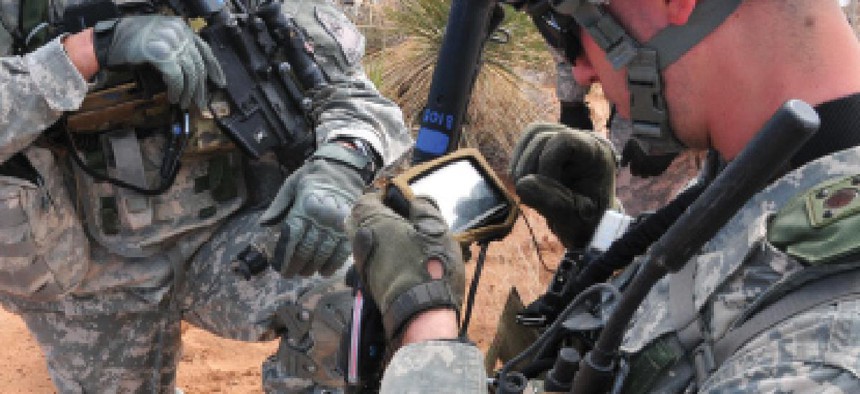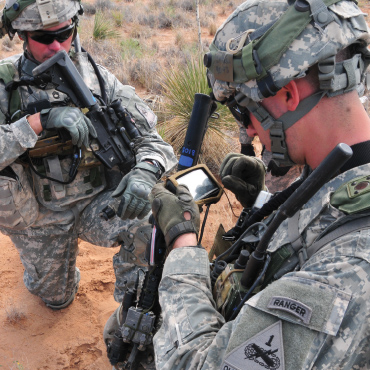RCO speeds through startup phase

The Army’s new Rapid Capabilities Office fast-tracks its own startup as it seeks to close technological gaps on the modern battlefield.

The Army's Rapid Capabilities Office aims to quickly push out needed technology to warfighters.
The Army's Rapid Capabilities Office is fast-tracking its own formation as it seeks to close technological gaps in cyber, electronic warfare and positioning and navigation on the battlefield.
The RCO, announced on Aug. 31, passed a critical milestone by holding its first board meeting, and is on its way to finalizing its charter by Nov. 1.
Maj. Gen. Walter Piatt, deputy director of the RCO, told FCW that to save time, the Army RCO "plagiarized [the charter] from the Air Force," since that is the model the Army is using for this new office.
"We sent [the charter] out to the four-star commands and the primary three-star staff officers... and said you've got to get back to us by the 14th of the month... and we're going to the secretary for signature at the end of the month," Piatt told FCW.
He said the Army typically would take a year or more to formalize a new entity like this, and standing it up quickly is a metaphor for what the office was created to do -- rapidly push out needed technology to warfighters.
"Technology is evolving at a speed that our acquisition process couldn't turn fast enough, but our adversaries [can], so that's why this office was created," said Piatt.
In fact, the RCO is as much a pilot program designed to spur acquisition reform as it is an entity tasked with finding technological solutions for the modern battlefield.
"I think we create efficiencies, we don't create workarounds," said Piatt, noting that RCO plans to take advantage of underutilized acquisition mechanisms like Other Transaction Authority. "Efficiencies can be created because existing policies aren't that constraining, it's just we don't create efficiencies," he added.
Piatt said that the office will provide commanders a view of the strategic environment and the technological demands on the ground in their areas of responsibility. The RCO, he explained, will be looking at "where the enemy is gaining advantage, where adversaries are closing gaps through their modernization plans and what we need to do to maintain our advantages and create the offset that the secretary of defense is trying to do."
"We saw what Russia's capabilities are when they went into Crimea, and what they were able to use," said Piatt. "We didn't keep pace in modernizing our electronic warfare fleet -- we downsized it -- and when we watched [Russia] it was an eye opener."
Piatt said the Army needs the tools to be able to monitor its networks to see if adversaries have penetrated them and put weapons systems at risk. "If we don't know they're doing it, we're really hurting," he said.
He said that cyber is a particular challenge because it is such a fast-evolving domain where there are new changes and challenges every day.
"We've got to know what is the cyber threat to our tactical systems," he said. "That's one part of the cyber problem, but it's the one that we're really looking at in the RCO. What can we do so our cyber protection teams aren't trying to defend the universe while also defending the squad? That's just too broad of a problem."
Piatt said that the purpose of the office isn't to provide a 100 percent solution to current problems or gaps. The RCO will focus on finding practical options, often based on existing technology from industry, and then present those options up the chain of command for approval and rapid deployment.
"[Industry is] learning, seeing things that we don't know about and we have problems that they don't know we have and we've got to get this together," said Piatt. But effective collaboration will require substantial changes in the way the Army does business he said. It will require a level of dialogue and transparency with industry that's been lacking.
"We have to look internally and say we're being difficult to talk to because we're in a big building, we're secure, it's tough to get inside to see us," he said. "'We want a dialogue,' we're always saying at these symposiums, but once the meeting's over, communications are cut. I accept that. Guilty as charged as an Army."
Piatt said he hopes to forge a new relationship with industry that involves formal, "rapid capability" industry days every couple of months where industry and all the services can share problems and solutions. He also hopes to see greater informal crosstalk and collaboration tools to share information.
"I'm concerned that if we don't get this right, we will not work -- that's my personal assessment," said Piatt.
The RCO is just finding its footing at a time of political and fiscal uncertainty in the U.S. and there are no guarantees the office will survive a change of administration. Officials have not disclosed the budget for the RCO, but they have said that funding mechanisms are in place for fiscal 2017.
No matter who wins the election, "our adversaries will continue to modernize their militaries, non-state actors will continue to find new ways to attack the U.S. and our interests here and abroad, and the Army is gonna be here trying to protect the homeland and our interests as well," Piatt said.
So, in one form or another, he said, the Army will need something like the RCO to bridge technological gaps and find ways to expedite getting the needed technology into the field.
"What we look like next year is probably not what we look like today," said Piatt. "I hope not... or we didn't do anything [with] the lessons we're about to learn."
NEXT STORY: SEWP to pilot 'CIO Portal' for purchasing data


